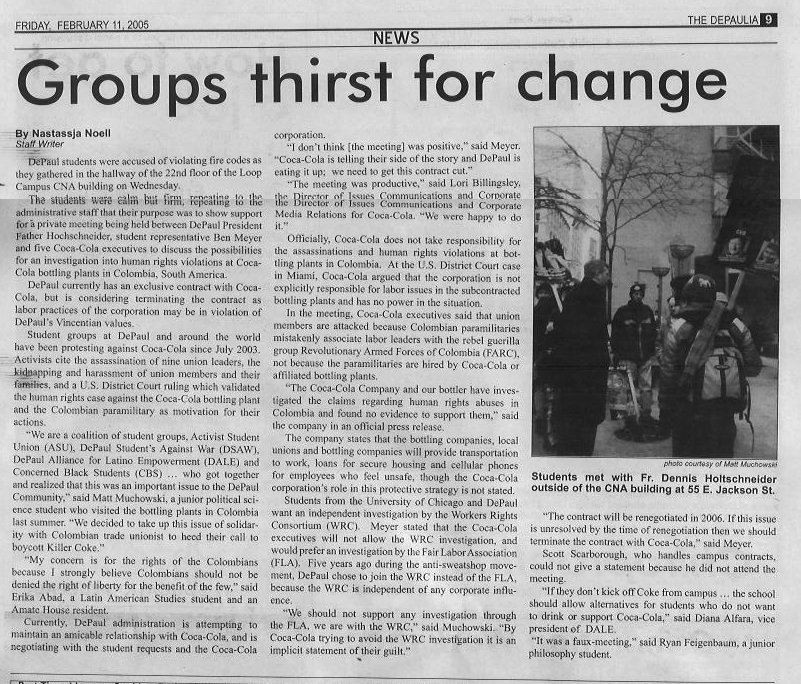The link to the article on the DePaulia's website is available here.
____________________________________________________________________________________________________
Groups thirst for change
by Nastassja Noell
Staff Writer
DePaul students were accused of violating fire codes as they gathered in the hallway of the 22nd floor of the Loop Campus CNA building on Wednesday.
The students were calm but firm, repeating to the administrative staff that their purpose was to show support for a private meeting being held between DePaul President Father Hochschneider, student representative Ben Meyer and five Coca-Cola executives to discuss the possibilities for an investigation into human rights violations at Coca-Cola bottling plants in Colombia, South America.
DePaul currently has an exclusive contract with Coca-Cola, but is considering terminating the contract as labor practices of the corporation may be in violation of DePaul’s Vincentian values.
Student groups at DePaul and around the world have been protesting against Coca-Cola since July 2003. Activists cite the assassination of nine union leaders, the kidnapping and harassment of union members and their families, and a U.S. District Court ruling which validated the human rights case against the Coca-Cola bottling plant and the Colombian paramilitary as motivation for their actions.
“We are a coalition of student groups, Activist Student Union (ASU), DePaul Student’s Against War (DSAW), DePaul Alliance for Latino Empowerment (DALE) and Concerned Black Students (CBS) … who got together and realized that this was an important issue to the DePaul Community,” said Matt Muchowski, a junior political science student who visited the bottling plants in Colombia last summer. “We decided to take up this issue of solidarity with Colombian trade unionist to heed their call to boycott Killer Coke.”
“My concern is for the rights of the Colombians because I strongly believe Colombians should not be denied the right of liberty for the benefit of the few,” said Erika Abad, a Latin American Studies student and an Amate House resident.
Currently, DePaul administration is attempting to maintain an amicable relationship with Coca-Cola, and is negotiating with the student requests and the Coca-Cola corporation.
“I don’t think [the meeting] was positive,” said Meyer. “Coca-Cola is telling their side of the story and DePaul is eating it up; we need to get this contract cut.”
“The meeting was productive,” said Lori Billingsley, the Director of Issues Communications and Corporate Media Relations for Coca-Cola. “We were happy to do it.”
Officially, Coca-Cola does not take responsibility for the assassinations and human rights violations at bottling plants in Colombia. At the U.S. District Court case in Miami, Coca-Cola argued that the corporation is not explicitly responsible for labor issues in the subcontracted bottling plants and has no power in the situation.
In the meeting, Coca-Cola executives said that union members are attacked because Colombian paramilitaries mistakenly associate labor leaders with the rebel guerilla group Revolutionary Armed Forces of Colombia (FARC), not because the paramilitaries are hired by Coca-Cola or affiliated bottling plants.
“The Coca-Cola Company and our bottler have investigated the claims regarding human rights abuses in Colombia and found no evidence to support them,” said the company in an official press release.
The company states that the bottling companies, local unions and bottling companies will provide transportation to work, loans for secure housing and cellular phones for employees who feel unsafe, though the Coca-Cola corporation’s role in this protective strategy is not stated.
Students from the University of Chicago and DePaul want an independent investigation by the Workers Rights Consortium (WRC). Meyer stated that the Coca-Cola executives will not allow the WRC investigation, and would prefer an investigation by the Fair Labor Association (FLA). Five years ago during the anti-sweatshop movement, DePaul chose to join the WRC instead of the FLA, because the WRC is independent of any corporate influence.
“We should not support any investigation through the FLA, we are with the WRC,” said Muchowski. “By Coca-Cola trying to avoid the WRC investigation it is an implicit statement of their guilt.”
“The contract will be renegotiated in 2006. If this issue is unresolved by the time of renegotiation then we should terminate the contract with Coca-Cola,” said Meyer.
Scott Scarborough, who handles campus contracts, could not give a statement because he did not attend the meeting.
“If they don’t kick off Coke from campus … the school should allow alternatives for students who do not want to drink or support Coca-Cola,” said Diana Alfara, vice president of DALE.
“It was a faux-meeting,” said Ryan Feigenbaum, a junior philosophy student.


No comments:
Post a Comment